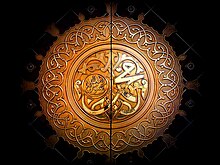This article is about the Islamic prophet. For other people named Muhammad, see Muhammad (name). For other uses, see Muhammad (disambiguation). For the Islamic view and perspective, see Muhammad in Islam.
Muhammad | |
|---|---|
| مُحَمَّد | |
 | |
| Born | c. 53 BH (570 CE)[1] |
| Died | 8 June 632 (aged 61–62) Medina, Hejaz, Arabia |
| Resting place | Green Dome at al-Masjid an-Nabawi, Medina, Arabia 24°28′03″N 39°36′41″E |
| Other names |
|
| Years active | 583–609 CE as merchant 610–632 CE as religious leader |
Notable work | Constitution of Medina |
| Successor | See Succession to Muhammad |
| Opponent(s) | Quraysh |
| Spouse(s) | See Muhammad's wives |
| Children | See Muhammad's children |
| Parent(s) | Abdullah ibn Abd al-Muttalib (father) Amina bint Wahb (mother) |
| Relatives | Family tree of Muhammad, Ahl al-Bayt ("Family of the House") |
| Arabic name | |
| Personal (Ism) | Muhammad |
| Patronymic (Nasab) | Muḥammad ibn Abd Allah ibn Abd al-Muttalib ibn Hashim ibn Abd Manaf ibn Qusai ibn Kilab |
| Teknonymic (Kunya) | Abu al-Qasim |
| Epithet (Laqab) | Khātam an-Nâbîyīn (Seal of the prophets) |
| Signature | |
Seal of Muhammad | |
Muhammad ibn Abdullah[n 1] (Arabic: مُحَمَّد بنِ عَبْد ٱللَّٰه, romanized: Muḥammad ibn ʿAbd Allāh Classical Arabic pronunciation: [muˈħammad]; c. 570 – 8 June 632 CE)[1][2] was an Arab religious, social, and political leader and the founder of the world religion of Islam.[3] According to Islamic doctrine, he was a prophet, divinely inspired to preach and confirm the monotheistic teachings of Adam, Abraham, Moses, Jesus, and other prophets.[3][4][5][6] He is believed to be the final prophet of God in all the main branches of Islam, though some modern denominations diverge from this belief.[n 2] Muhammad united Arabia into a single Muslim polity, with the Quran as well as his teachings and practices forming the basis of Islamic religious belief.
Muhammad was born approximately 570 CE in Mecca.[1] He was the son of Abdullah ibn Abd al-Muttalib and Amina bint Wahb. His father Abdullah was the son of Quraysh tribal leader Abd al-Muttalib ibn Hashim, and he died a few months before Muhammad's birth. His mother Amina died when he was six, leaving Muhammad an orphan.[7] He was raised under the care of his grandfather, Abd al-Muttalib, and paternal uncle, Abu Talib.[8] In later years, he would periodically seclude himself in a mountain cave named Hira for several nights of prayer. When he was 40, Muhammad reported being visited by Gabriel in the cave[1][9] and receiving his first revelation from God. In 613,[10] Muhammad started preaching these revelations publicly,[11] proclaiming that "God is One", that complete "submission" (islām) to God[12] is the right way of life (dīn),[13] and that he was a prophet and messenger of God, similar to the other prophets in Islam.[14][15][16]
Muhammad's followers were initially few in number, and experienced hostility from Meccan polytheists for 13 years. To escape ongoing persecution, he sent some of his followers to Abyssinia in 615, before he and his followers migrated from Mecca to Medina (then known as Yathrib) later in 622. This event, the Hijra, marks the beginning of the Islamic calendar, also known as the Hijri Calendar. In Medina, Muhammad united the tribes under the Constitution of Medina. In December 629, after eight years of intermittent fighting with Meccan tribes, Muhammad gathered an army of 10,000 Muslim converts and marched on the city of Mecca. The conquest went largely uncontested and Muhammad seized the city with little bloodshed. In 632, a few months after returning from the Farewell Pilgrimage, he fell ill and died. By the time of his death, most of the Arabian Peninsula had converted to Islam.[17][18]
The revelations (each known as Ayah – literally, "Sign [of God]") that Muhammad reported receiving until his death form the verses of the Quran, regarded by Muslims as the verbatim "Word of God" on which the religion is based. Besides the Quran, Muhammad's teachings and practices (sunnah), found in the Hadith and sira (biography) literature, are also upheld and used as sources of Islamic law (see Sharia).



0 Comments